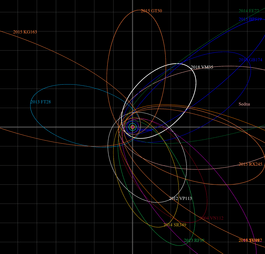2018 VM35
2018 VM35 is an extreme trans-Neptunian object from the outermost region of the Solar System, approximately 130 kilometers (80 miles) in diameter. With a perihelion distance greater than 40 AU, it is considered a detached object. At its discovery it is only the 10th object known with a perihelion over 45 AU and semimajor axis over 150 AU.[5] It is currently 55 AU (8.2 billion km) from the Sun and thus moves slowly across the sky.
 Orbit of 2018 VM35 with other extreme trans-Neptunian objects | |
| Discovery [1] | |
|---|---|
| Discovery site | Mauna Kea Obs. |
| Discovery date | 6 November 2018 (first observed only) |
| Designations | |
| 2018 VM35 | |
| E-SDO[2] · TNO [3][2] · distant [1] | |
| Orbital characteristics [1] | |
| Epoch 31 May 2020 (JD 2459000.5) | |
| Uncertainty parameter 4 | |
| Observation arc | 389 days |
| Aphelion | 488.042 AU |
| Perihelion | 44.690 AU |
| 266.366 AU | |
| Eccentricity | 0.83222 |
| 4347 yr | |
| 356.871° | |
| 0° 0m 0.816s / day | |
| Inclination | 8.480° |
| 192.396° | |
| 303.474° | |
| Physical characteristics | |
Mean diameter | 130 km (est. at 0.09)[4] |
| 25.2 (opposition) | |
| 7.7[1] 7.72[3] | |
Orbit and classification
2018 VM35 orbits the Sun at an average distance of about 266 AU once every 4,347 years. Its orbit has a high eccentricity of 0.83 and an inclination of 8.48° with respect to the ecliptic.[3] As with any slow moving object beyond the orbit of Neptune, an observation arc of several years is required to constrain the orbital parameters.
It is predicted to reach perihelion (closest approach to the Sun) around 2058 coming to opposition in February 2058, while only reaching magnitude 24.3.
Physical characteristics
Based on a generic magnitude-to-diameter conversion, 2018 VM35 measures approximately 130 kilometers (81 miles) for an absolute magnitude of 7.6 and an assumed albedo of 0.09.[1][4]
See also
References
- "2018 VM35". Minor Planet Center. Retrieved 22 February 2019.
- "List Of Centaurs and Scattered-Disk Objects". Minor Planet Center. Retrieved 22 February 2019.
- "JPL Small-Body Database Browser: (2018 VM35)" (2019-02-03 last obs.). Jet Propulsion Laboratory. Retrieved 22 February 2019.
- "Asteroid Size Estimator". CNEOS NASA/JPL. Retrieved 22 February 2019.
- https://minorplanetcenter.net//db_search/show_by_properties?perihelion_distance_min=45&semimajor_axis_min=150